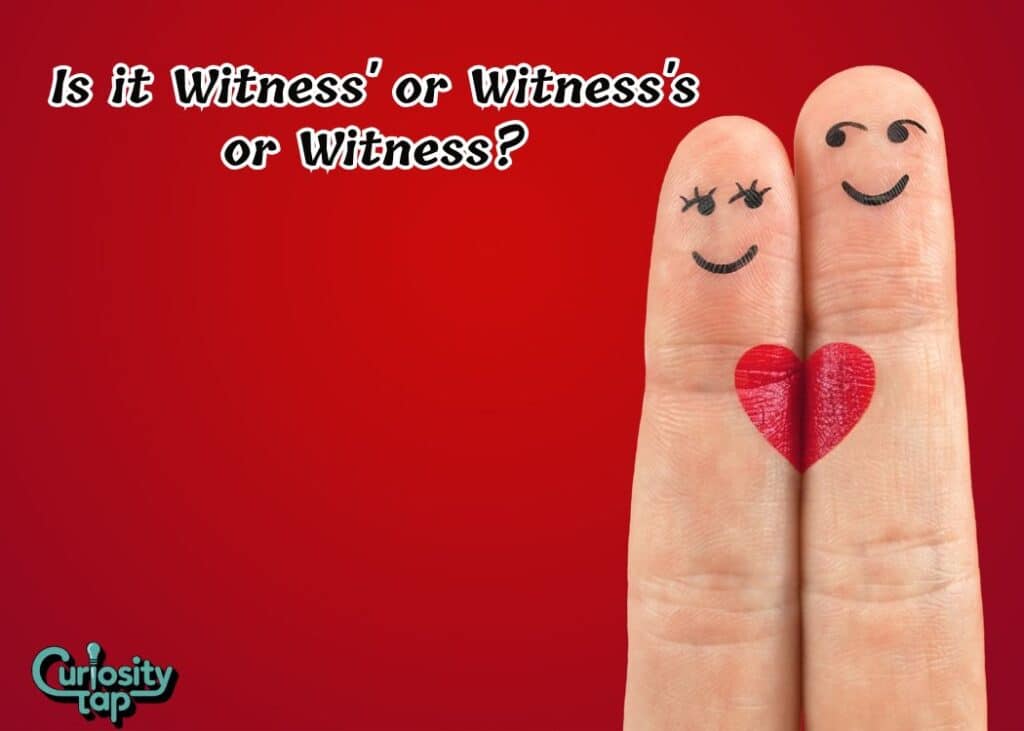Have you ever found yourself staring at a sentence, wondering whether to write “witness’s testimony” or “witness’ testimony“?
You’re not alone. This grammar puzzle has stumped countless writers, from legal professionals drafting court documents to journalists reporting breaking news.
The confusion is understandable – after all, the word “witness” ends in an “s,” which makes the possessive form tricky to navigate.
Whether you’re a law student preparing your first legal brief, a reporter covering a high-profile trial, or simply someone who values clear communication, mastering this grammar rule is essential.
Getting it wrong can make your writing look unprofessional and potentially confuse your readers about whose testimony or statement you’re discussing.
In this comprehensive guide, we’ll unravel the mystery once and for all. You’ll discover the correct possessive forms, understand when to use each variation, and gain the confidence to write with grammatical accuracy in any professional context.
The Meaning of Witness in Grammar and Legal Context
Before diving into the possessive forms, let’s establish what “witness” means in different contexts. Understanding the definition helps clarify why proper grammar usage matters so much.
A witness is a person who observes an event, provides testimony in legal proceedings, or signs a document to verify its authenticity. In legal writing, witnesses play crucial roles in:
- Court testimony during trials
- Affidavit signing and verification
- Police statements and incident reports
- Contract witnessing and document authentication
The word “witness” functions as both a noun and a verb in English grammar. As a noun, it requires different possessive forms depending on whether we’re talking about one witness or multiple witnesses. This distinction is where most writers encounter difficulties.
Understanding the Possessive Forms: Witness’s vs Witness’
The possessive form of “witness” depends on established grammar rules and style guide recommendations. Let’s break down each option:
Witness’s: The Standard Choice
Witness’s is the most widely accepted possessive form for the singular noun “witness.” This follows the standard English grammar rule for creating possessives: add an apostrophe + s to singular nouns, even when they end in “s.”
Examples of correct usage:
- The witness’s testimony was crucial to the case
- Sarah examined the witness’s statement carefully
- The judge questioned the witness’s credibility
- The lawyer reviewed the witness’s affidavit before court
Witness’: The Alternative Style
Witness’ (apostrophe only) is an alternative form that some style guides accept, particularly when following certain journalistic standards. However, this form is less common in modern professional writing.
When you might see witness’ used:
- In older legal documents
- Some newspaper articles following specific style guide requirements
- Academic papers adhering to particular formatting rules
The Plural Possessive: Witnesses’
When dealing with multiple witnesses, the plural possessive form is witnesses’ (apostrophe after the s). This follows the grammar rule for plural nouns ending in “s.”
Examples of witnesses’ in action:
- The witnesses’ testimonies contradicted each other
- The prosecutor compared all the witnesses’ statements
- The jury carefully considered the witnesses’ credibility
- The defense attorney challenged the witnesses’ reliability
Style Guide Recommendations and Professional Standards
Different style guides offer varying recommendations for possessive forms. Understanding these differences helps you choose the right approach for your writing context.
Associated Press Stylebook Approach
The Associated Press Stylebook generally recommends using witness’s for the singular possessive. This style guide emphasizes clarity and consistency in news reporting.
Chicago Manual of Style Guidelines
The Chicago Manual of Style strongly supports witness’s as the correct possessive form. This style guide is widely used in academic writing and professional publishing.
Legal Writing Standards
Most legal writing authorities recommend witness’s for singular possession. Legal documents require precision and clarity, making the standard apostrophe + s rule the safest choice.
Real-World Applications and Examples
Understanding possessive forms becomes crucial in various professional contexts. Let’s explore how these rules apply in real situations.
Courtroom Usage
In courtroom proceedings, legal professionals must use correct grammar to ensure clear communication:
- “The witness’s testimony supports the plaintiff’s claim”
- “Your Honor, the witness’s statement contains inconsistencies”
- “The defense objects to the witness’s credibility“
News Reporting Context
Journalists covering legal cases need grammatical accuracy to maintain professional credibility:
- “The witness’s account of the accident differed from police reports”
- “Investigators questioned the witness’s timeline of events”
- “The witness’s identification of the suspect was crucial”
Legal Document Preparation
Legal documents require precise grammar to avoid ambiguity:
- “The witness’s signature appears on page three”
- “We hereby attach the witness’s sworn statement“
- “The witness’s presence is required at the hearing”
Common Grammar Pitfalls to Avoid
Even experienced writers make mistakes with possessive forms. Here are the most common errors and how to avoid them:
Mistake 1: Using “Witness” Without Possession
Incorrect: “The witness testimony was compelling”
Correct: “The witness’s testimony was compelling”
Mistake 2: Confusing Singular and Plural
Incorrect: “The witnesses’s statements” (double s)
Correct: “The witnesses’ statements” (apostrophe after s)
Mistake 3: Inconsistent Style
Incorrect: Switching between “witness’s” and “witness'” in the same document
Correct: Choose one style and maintain consistency throughout
Mistake 4: Apostrophe Placement Errors
Incorrect: “The witnes’s statement” (missing s before apostrophe)
Correct: “The witness’s statement” (complete word + apostrophe + s)
Expert Tips for Perfect Grammar Usage
Following these professional writing guidelines will help you use possessive forms correctly every time:
Choose Your Style Guide Early
Select either Associated Press, Chicago Manual of Style, or your organization’s style guide at the beginning of your writing project. Consistency is more important than the specific choice.
Create a Reference Sheet
Keep a quick reference of possessive forms handy:
- Singular: witness’s
- Plural: witnesses’
- Possessive pronoun: whose (not who’s)
Practice with Examples
Regular practice with sentence examples helps reinforce correct usage:
- “The witness’s nervousness was apparent”
- “Both witnesses’ accounts matched perfectly”
- “The judge evaluated each witness’s credibility“
Use Grammar Tools Wisely
While grammar checkers can help, they’re not perfect. Always double-check possessive forms manually, especially in legal writing or professional documents.
Bonus Tip: The Memory Trick That Never Fails
Here’s a professional secret that legal writers and journalists use to remember possessive forms: Think of “witness’s” as “witness his” or “witness her.” If you can substitute “his” or “her” for the possessive, you need witness’s. If you’re talking about multiple people, use witnesses’.
Try this mental trick:
- “The witness’s testimony” = “The witness his testimony” ✓
- “The witnesses’ statements” = “The witnesses their statements” ✓
This simple substitution method works for any possessive noun and eliminates guesswork from your writing process.
Why Proper Grammar Matters in Professional Writing
Grammatical accuracy isn’t just about following rules – it’s about professional credibility and clear communication. In legal contexts, incorrect grammar can lead to:
- Misunderstanding of crucial legal documents
- Reduced credibility in court proceedings
- Confusion about witness testimony and statements
- Professional embarrassment in formal writing
Journalists and writers who master possessive forms demonstrate attention to detail and linguistic precision. This expertise builds reader trust and enhances professional reputation.
Practical Advice for Different Writing Contexts
For Legal Professionals
Legal writing demands precision. Always use witness’s for singular possession and witnesses’ for plural possession. Consistency throughout legal documents is essential for professional credibility.
For Journalists and Writers
Follow your newsroom’s style guide consistently. When in doubt, witness’s is the safer choice for singular possessive forms. Proofreading is crucial before publication.
For Students and Academics
Academic writing typically follows Chicago Manual of Style guidelines. Use witness’s for singular possessive and always maintain consistency throughout your papers.
For Business Communications
Professional emails and business documents should use witness’s for singular possession. Clear communication enhances business relationships and professional image.
Conclusion
Mastering the possessive forms of “witness” is simpler than it initially appears. Remember these key points:
Witness’s is the standard singular possessive form accepted by major style guides. Witnesses’ is the correct plural possessive form. Consistency in your chosen style is more important than the specific variation you select.
Whether you’re drafting legal documents, writing news articles, or preparing academic papers, correct grammar enhances your professional credibility and ensures clear communication. Practice these grammar rules regularly, and they’ll become second nature in your writing process.
Frequently Asked Question
What is the correct possessive form of witness?
The correct possessive form is witness’s for singular possession and witnesses’ for plural possession. Most style guides including the Chicago Manual of Style and Associated Press Stylebook recommend witness’s as the standard singular possessive form.
When should I use witness’ instead of witness’s?
Witness’ (apostrophe only) is rarely used in modern professional writing. Some older style guides or specific journalistic standards might accept it, but witness’s is the preferred and more widely accepted possessive form in contemporary English grammar.
How do I handle multiple witnesses in possessive form?
For multiple witnesses, use witnesses’ (apostrophe after the s) following the plural possessive rule. For example: “The witnesses’ testimonies were consistent” or “The judge reviewed all the witnesses’ statements” demonstrates correct grammar for plural possession.
What’s the difference between witness’s and witnesses’ in legal writing?
In legal writing, witness’s refers to something belonging to one witness (singular), while witnesses’ refers to something belonging to multiple witnesses (plural). Legal documents require precise grammar to avoid ambiguity in court proceedings and legal interpretation.
Read more knowledgeable blogs on Curiosity Tap
Is this article helpful?

Jackson Pearson is a passionate educator and language enthusiast behind the blog Jackson Pearson. With years of experience in teaching and writing, he specializes in simplifying complex grammar rules, breaking down tricky vocabulary, and crafting learning guides that are both engaging and practical. His mission is to help readers boost their English skills whether they’re beginners or brushing up for fluency. Through every article, Jackson brings clarity, structure, and a spark of curiosity to the world of English learning.



